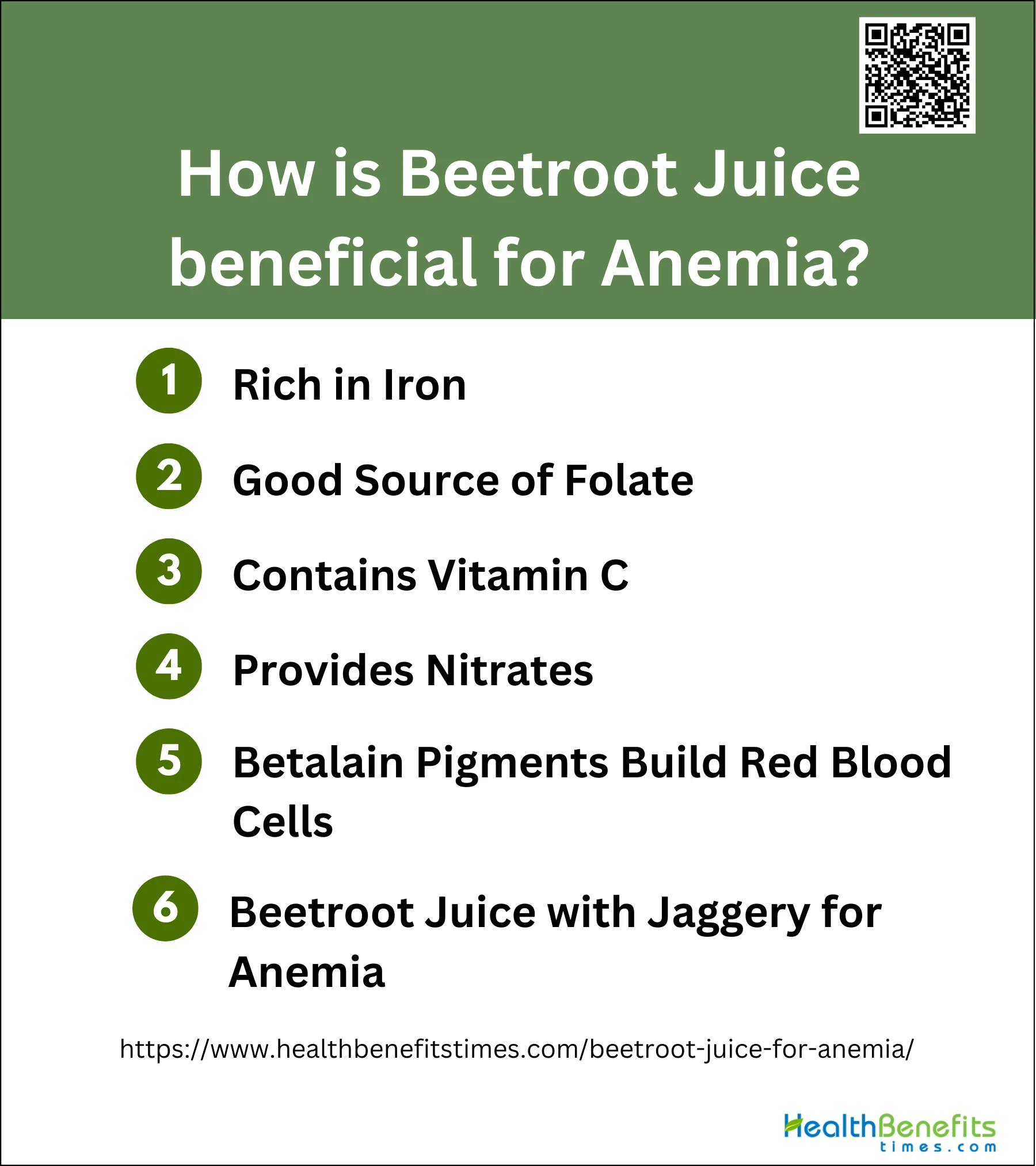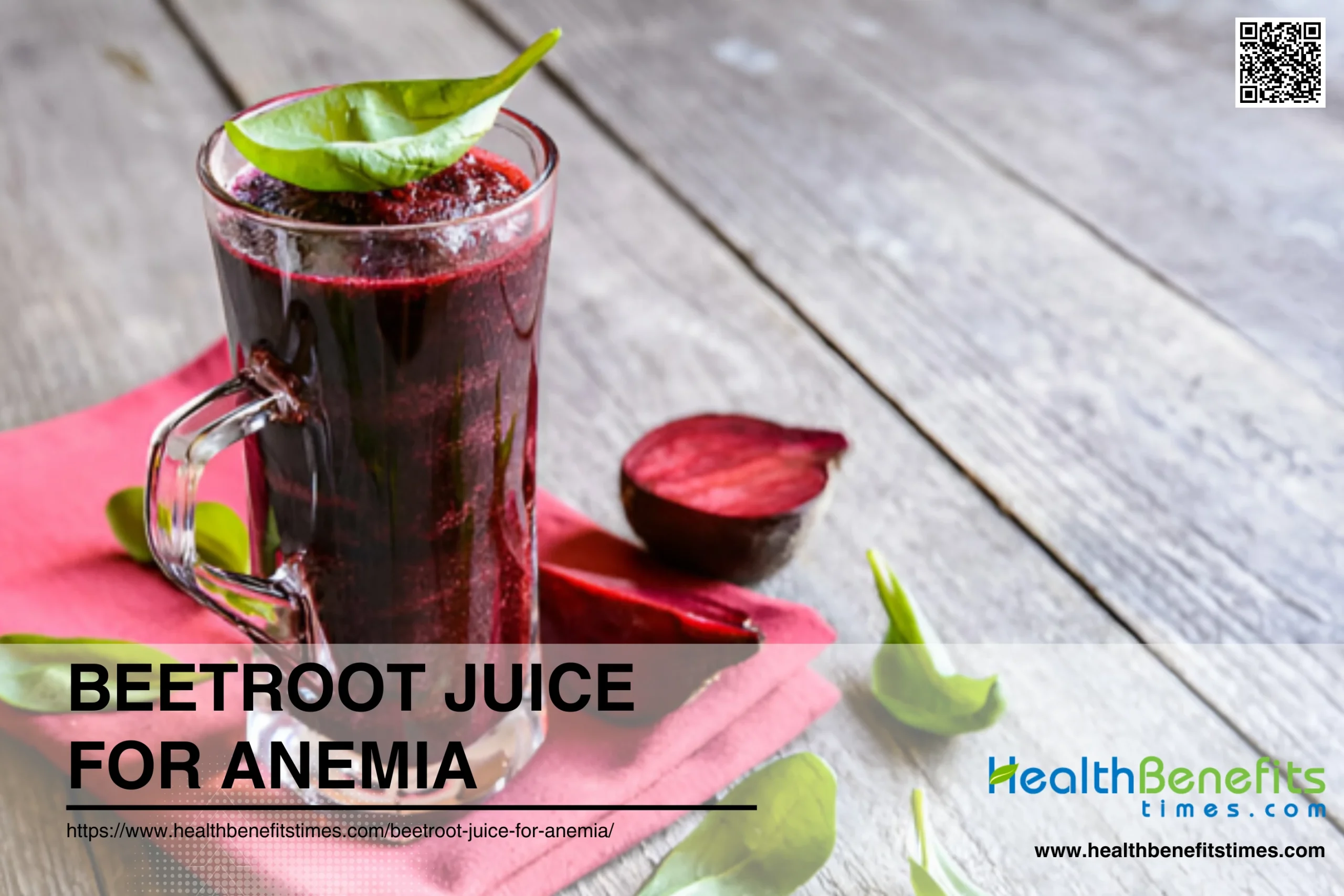Anemia, a condition characterized by a deficiency of red blood cells or hemoglobin, can lead to a host of symptoms including fatigue, weakness, and shortness of breath. Among the natural remedies gaining attention for their potential to combat this condition is beetroot juice. Rich in iron, folic acid, and antioxidants, beetroot juice is thought to aid in the enhancement of red blood cell production, offering a natural boost to those grappling with anemia. This introductory exploration will delve into the nutritional profile of beetroot juice and its proposed benefits for improving anemia, shedding light on how this vibrant root vegetable may be more than just a colorful addition to our diets.
What is Beetroot?
Beetroot, which is a deep purple or reddish root vegetable, comes from the taproot of the beet plant, scientifically named Beta vulgaris. People worldwide enjoy eating beetroots, whether cooked or pickled, appreciating their rich, earthy taste and vibrant color from betalain pigments. You can roast, boil, or use them raw in salads. Beetroots are packed with nutrients like folate, manganese, potassium, iron, and vitamin C.
What is Anemia?
Anemia is when the blood doesn’t have enough red blood cells or hemoglobin, which can make it harder to carry oxygen. It’s a common health problem around the world that can affect people of all ages for various reasons. According to the World Health Organization (WHO), anemia is when hemoglobin levels drop below 12.0 g/dL in women and 13.0 g/dL in men. There are many causes of anemia, like not getting enough nutrients (such as iron, folate, or vitamin B12), having ongoing health issues (such as kidney disease, cancer, or inflammation), or losing blood over time. In certain groups, like older adults or those with HIV, anemia can have a big impact, making life tougher and raising the risk of getting sicker or even dying. Anemia during pregnancy is especially worrisome because of the higher need for iron and the potential harm it can cause to both the mother and baby.
How is Beetroot Juice beneficial for Anemia?
Beetroots are a nutrient-dense superfood that can help combat anemia. Here’s why:
1. Rich in Iron
Beetroot’s iron content aids in oxygen transport to red blood cells, thereby helping to cure anemia. Studies involving pregnant women have shown that beetroot supplementation, alongside traditional iron tablets, significantly improves hemoglobin and erythrocyte levels, suggesting its efficacy as a complementary therapy. Moreover, beetroot’s non-pharmacological nature makes it a favorable alternative for those who experience adverse effects from conventional iron supplements.
2. Good Source of Folate
Our bodies can’t make folate on their own, so we need to get it from our diets to avoid deficiencies. Studies have proven that using beetroot in dietary plans can significantly boost folate levels in our bodies. For example, a study in Tanzania showed that giving participant’s beetroot juice and folate supplements together led to a big increase in folate levels in their blood and saliva. This suggests that people found the intervention easy to follow and liked it. Another study looked into adding red beetroot extract to yogurt to increase its folate content. They found that the yogurt’s folate levels went up a lot with the beetroot, making the yogurt more nutritious without changing how it tastes, even when beetroot was included at levels up to 10%. These results show that beetroot is a natural and effective way to get more folate in our diets and fight deficiencies.
3. Contains Vitamin C
Beetroot is a great source of important nutrients like vitamin C, which is key to its health benefits. Research shows that whether you eat beetroot raw, drink its juice, or have it in other forms, you get a good dose of vitamin C that boosts its antioxidant power. Pairing beetroot with vitamin C supplements has been studied for its ability to control the creation of N-nitroso compounds, which are linked to cancer risks. One study found that taking vitamin C supplements could stop these compounds from increasing after drinking beetroot juice, showing how vitamin C protects against potential harmful effects. With its high vitamin C levels and other healthy compounds, beetroot helps improve heart health by enhancing lipid profiles and lowering blood pressure, making it a valuable addition to a healthy diet.
4. Provides Nitrates
When you eat beetroot, the nitrate turns into nitric oxide in your body, which helps your blood vessels work better, makes your arteries less stiff, and brings down your blood pressure. Research shows that drinking beetroot juice can up your nitrate and nitrite levels, giving you a boost in exercise and heart health. The cool thing is, beetroot has these natural compounds like betanin, saponins, and polyphenols that act like antioxidants, giving you even more health goodness. Now, while beetroot juice may not work the same for everyone, especially if you’re already taking meds for high blood pressure, the overall evidence says beetroot can be a solid add-on to your diet for a healthier heart and better workouts.
5. Betalain Pigments Build Red Blood Cells
Betalains, like betacyanins and betaxanthins, are water-soluble pigments that not only add beauty but also pack a punch with antioxidant, anti-inflammatory, and anti-cancer properties. Researchers have dug deep into extracting and using betalains from beetroot, unveiling their potential as functional food ingredients. For example, betalain extracts from beetroot have shown higher antioxidant power when taken from hairy root cultures rather than mature beetroots, offering a way to boost their benefits. Moreover, studies on their stability under different storage conditions reveal that betaxanthins are generally more resilient than betacyanins, especially at mild temperatures. Exploring the addition of betalains to foods like ice cream has proven that they not only work as natural colorants but also enhance the taste and safety of the product. Plus, the distribution of betalains in different parts of the beetroot plant varies, with the peel having the most, followed by the flesh and petioles, providing options to maximize pigment yield. Altogether, the various uses and health advantages of beetroot’s betalains highlight their potential as valuable natural additives in the food industry.
6. Beetroot Juice with Jaggery for Anemia
Beetroot juice mixed with jaggery has shown promising results in treating anemia, especially in adolescent girls and pregnant women. Beetroot juice is packed with nutrients like nitrates, beta carotene, folic acid, vitamin C, and iron, which are crucial for boosting hemoglobin levels and improving blood health. Research indicates that beetroot juice helps release stored iron, enhances hemoglobin levels, and effectively combats anemia. Jaggery, rich in iron and folate, complements beetroot juice by further increasing hemoglobin levels and addressing menstrual problems in adolescent girls. A study in Gujarat with adolescent girls found a notable rise in hemoglobin levels after using beetroot juice with jaggery, showing its effectiveness as a natural anemia remedy. Moreover, beetroot juice enhances blood parameters like red blood cell count and iron levels, making it beneficial for athletes and those with iron deficiency anemia. The combination of beetroot juice and jaggery provides a natural and effective way to fight anemia, backed by multiple studies proving its efficacy.
Incorporating Beetroot Juice into your diet
Incorporating beetroot juice into your diet can be beneficial for various health reasons, including improving blood pressure, enhancing exercise performance, and supporting cardiovascular health. Here are several methods to include beetroot juice in your daily routine:
- Direct Consumption: Drink a glass of pure beetroot juice daily. This is the most straightforward method and ensures you get a concentrated dose of its nutrients.
- Smoothies: Blend beetroot juice with other fruits and vegetables like apples, carrots, and spinach. This not only enhances the flavor but also adds additional nutrients.
- Salad Dressings: Mix beetroot juice with olive oil, lemon juice, and your favorite herbs to create a vibrant and nutritious salad dressing.
- Soups: Add beetroot juice to soups for a rich color and added nutrients. It pairs well with vegetable or chicken broth.
- Baked Goods: Use beetroot juice as a natural food coloring in cakes, muffins, and bread. It adds a unique flavor and a nutritional boost.
- Combining with Other Juices: Mix beetroot juice with other vegetable or fruit juices like carrot, apple, or orange juice. This can make the taste more palatable and provide a variety of nutrients.
- Sports Drinks: Consume beetroot juice before exercise to enhance performance and endurance. It is particularly beneficial for athletes and those engaging in high-intensity workouts.
- Dietary Supplements: If fresh juice is not available, beetroot powder can be mixed with water or smoothies. It is a convenient alternative that still provides the benefits of beetroot.
- Health Tonics: Combine beetroot juice with amla (Indian gooseberry) juice for a potent health tonic that can help with conditions like gonorrhea and improve overall health.
Potential Side Effects and Precautions
Here is a list of potential side effects and precautions of beetroot juice:
- High Nitrate Content: Excessive intake can lead to the formation of N-nitroso compounds, which are carcinogenic.
- Digestive Issues: May cause flatulence, nausea, and other gastrointestinal discomforts.
- Beeturia: Can cause red or pink urine and stool, which is generally harmless but can be alarming.
- Kidney Stones: High in oxalates, which can contribute to kidney stone formation in susceptible individuals.
- Blood Pressure: Can significantly lower blood pressure, which may be problematic for individuals with hypotension or those on blood pressure medications.
- Liver Effects: While it has hepatoprotective properties, individuals with liver conditions should use it cautiously.
- Allergic Reactions: Some individuals may experience allergic reactions, though this is rare.
- Interaction with Medications: Can interact with medications, especially those affecting blood pressure and blood clotting.
- Iron Absorption: May affect iron absorption, which can be beneficial or detrimental depending on individual health conditions.
- Blood Sugar Levels: Contains natural sugars, which can affect blood glucose levels, particularly in individuals with diabetes.
- Exercise Performance: While beneficial for many, it may not significantly enhance performance in all types of physical activities.
- Taste and Compliance: Some individuals may find the taste unpleasant, leading to poor compliance with regular consumption.
Comments
comments
